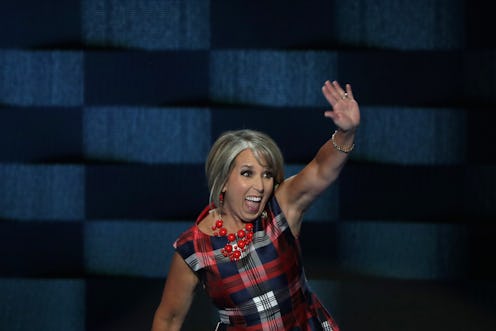News
These 9 Women Were Elected Governor In The 2018 Elections

Women candidates made major gains in the midterms at every level of government, including the nine women who were elected governor in the 2018 elections. Although they didn't break a record, the new governor-elects matched the highest number of women to serve as governor simultaneously that was set in 2004 and then in 2007, according to the Center for American Women and Politics (CAWP).
A total of 16 women ran for governor in 2018 general elections, including four incumbents, all of whom kept hold of their seats on Tuesday. Six women currently lead state governments, but Mary Fallin (R-Okla.) and Susana Martinez (R-N.M.) couldn't seek reelection due to term limits. Just 39 women have ever served as governor in the United States, according to CAWP.
One of the closest watched gubernatorial races of 2018 hadn't yet been called on Wednesday morning, but Georgia Democratic candidate Stacey Abrams barely trailed behind Republican Brian Kemp, per Politico. Abrams vowed on Twitter to "fight for every vote" in a race plagued by accusations that the Republican Party was suppressing voters.
While that race remains in limbo, here are the nine women who definitely won their respective governor's races:
Gina Raimondo (D-R.I.)
Rhode Island's first woman governor, Gina Raimondo, won her bid for reelection on Tuesday after first taking office in 2015. Access to abortion in the state largely hinged on the governor's race, as Raimondo has urged state lawmakers to codify abortion rights into the state constitution (which they've failed to do twice now). Her Republican opponent wouldn't say whether or not he supported the move.
Gretchen Whitmer (D-Mich.)
Gretchen Whitmer's victory in Michigan was also a victory for reproductive rights. She vowed to work with state legislators to get rid of a pre-Roe v. Wade ban that could make obtaining an abortion a felony in the state if the U.S. Supreme Court dismantles the federal protection, while her Republican opponent told the Detroit News in July that he would “enforce the laws on the books, just as he does now as attorney general” if elected.
Whitmer previously served as a Michigan state representative and Michigan state senator.
Janet Mills (D-Maine)
Currently serving as the attorney general of Maine, Janet Mills' win on Tuesday will make her the state's first woman governor. Republican Gov. Paul LePage (who once called people of color the "enemy") was term limited, so Mill's GOP opponent was local business owner Shawn Moody.
Kate Brown (D-Ore.)
Oregon Gov. Kate Brown defeated a Republican challenger in order to keep her residence at the governor's mansion. After winning her first gubernatorial race in 2014, Brown became the first openly bisexual governor in U.S. history.
Kay Ivey (R-Alab.)
Fellow incumbent Kay Ivey also held onto her seat despite a Democratic challenger. Ivey previously served as both Alabama's state treasurer and lieutenant governor before becoming Alabama's second female governor in 2017 when former Gov. Robert Bentley resigned.
Kim Reynolds (R-Iowa)
Ivanka Trump voiced her support for Iowa Gov. Kim Reynolds throughout the 2018 campaign, and Reynolds ultimately held onto her seat. She was previously lieutenant governor, and took over the governor's office in 2017 after the president appointed her predecessor, Gov. Terry Branstad, the U.S. ambassador to China.
Kristi Noem (R-S.D. )
Kristi Noem made history on Tuesday when she was elected as South Dakota's first woman governor. Noem currently serves on Capitol Hill as the state's only representative in the U.S. House.
Laura Kelly (D-Kans.)
Laura Kelly, a Kansas state senator since 2005, beat Republican Kris Kobach, the state's secretary of state who took after President Donald Trump.
Like Rhode Island and Michigan, the future of abortion rights in Kansas depended on the governor's race because of a state code that recognizes "fetal rights" and a state legislature that has consistently passed abortion restrictions. Kelly was endorsed by Planned Parenthood and the pro-choice political action committee Emily's List, while Kobach tweeted in July that "Roe v. Wade's days are numbered. And when Planned Parenthood comes to Kansas to legalize abortion, I will fight back and protect the pro-life values that Kansans hold dear."
Michelle Lujan Grisham (D-N.M.)
Currently a representative for New Mexico in the U.S. House, Michelle Lujan Grisham won her bid for governor on Tuesday, making her the state's first Democratic Latina governor, according to The Hill. She'll succeed Republican Gov. Susana Martinez, who was term-limited, and be replaced on Capitol Hill by Democrat Deb Haaland.
Although a handful of other women candidates lost their bids for governor this year, the nation will have three more women governors in 2019 compared to 2018.